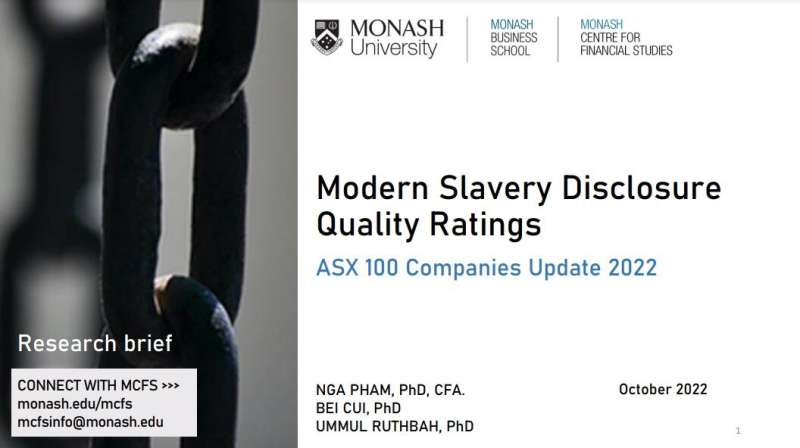Active monitoring needed in Australian modern slavery reporting regime

In only the second year of mandatory reporting, Australia's top companies have made substantial improvements in the quality of their disclosures on modern slavery risks within their operations and supply chains.
However, the Monash Center for Financial Studies' (MCFS) Modern Slavery Research Program, which investigates the quality of company disclosures, is calling on the Federal Government and regulators to actively assist companies in tackling the reporting challenges and monitor the quality of disclosures, rather than forcing them to go it alone.
In a report released today, researchers from Monash University argue governments and regulators must take an active role to guide and monitor disclosures, particularly from companies where compliance is still poor.
"A review of the act is currently underway. One of our recommendations is that the Australian Government must review the quality of the Modern Slavery Statements submitted and provide timely feedback to ensure reporting quality and consistency," says Dr. Nga Pham, senior research fellow from the Monash Center for Financial Studies.
"More guidance is needed for companies to improve their remediation mechanisms and processes. The government should strengthen the act and its guidance document."
The Commonwealth Modern Slavery Act 2018 commenced operation on 1 January 2019, creating reporting obligations for entities that have consolidated revenue of at least $100 million for the relevant reporting period a financial year. The act requires companies to report on and identify risks around modern slavery in their operations and supply chains.
The term "modern slavery" refers to conduct that would constitute an offense under existing human trafficking, slavery and slavery-like offenses and includes child labor, forced labor, human trafficking, debt bondage, forced marriage and deceptive recruiting for labor or services.
Modern slavery disclosure is a critical step in mitigating the risk associated with modern slavery practices in companies' operations and supply chains. The quality of the disclosure signals the level of commitments and efforts that the companies have put in managing these risks.
Assessing publicly available reports submitted from ASX 300 companies, MCFS researchers, Dr. Nga Pham Dr. Ummul Ruthbah and Dr. Bei Cui rated the companies from A–F on how well they address all reporting requirements.
In the second year of the Modern Slavery Disclosure Index, the researchers updated the index with a change in methodology to reflect the increasing complexity of reporting, examining more granular elements of risk identification, due diligence and remediation processes.
Where previous reports have assigned a rank to ASX 100 companies based on the overall score, now a rating system is in use.
Under the new methodology, biggest improvements in the disclosure quality scores are the statements of Aristocrat (ALL), Bendigo and Adelaide Bank (BEN), Cleanaway (CWY), Goodman (GMG), QBE Insurance (QBE) and Seek (SEK), which have climbed at least three grades to either A or B.
Real estate, utilities and consumer staples continued to be the highest-scoring industries.
Key findings to note under the new methodology:
- 64% of FY2021 statements were upgraded compared to FY2020, and no statements were downgraded.
- In FY 2021, 26% of statements were rated A, and 31% were rated B—a substantial increase from the 15% of statements rated A and B last year.
- One in 12 statements still received a "fail" grade of either E or F—this is a reduction of 64%, indicating improvement among many statements that were in the bottom grades last year.
- New best practices of modern slavery due diligence and remediation processes have emerged, as well as processes for reporting entities to assess the effectiveness of their actions.
The researchers found that top companies which were already strong in reporting are continuing to improve their performance.
Methods used included improved visibility, investigating more deeply into their supply chains and using traceability technology to map out the provenance of products and their inputs in their extended supply chains.
"The best statements are getting better, with new practices around due diligence and remediation processes, as well as processes for reporting entities to use to assess the effectiveness of their actions," says Dr. Pham.
Dr. Pham argues major investors can also play an important role by proactively engaging with their companies to improve disclosures.
"Asset managers and asset owners should walk their talk, take actions to combat modern slavery, and report well under the act," she says.
Provided by Monash University





















